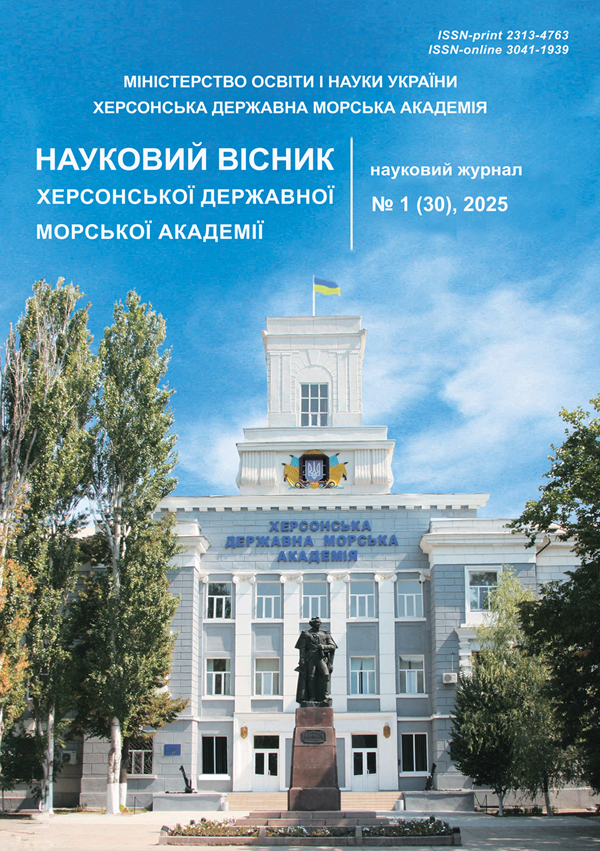ІНТЕГРАЦІЯ РИЗИК-АНАЛІЗУ В ОЦІНЮВАННЯ ЕНЕРГОЕФЕКТИВНОСТІ СУДЕН ПРИ ЗМІНІ ШВИДКІСНИХ РЕЖИМІВ
https://doi.org/10.33815/2313-4763.2025.1.30.059-068
Анотація
У статті представлено комплексну математичну модель оцінювання ризиків в умовах зниження швидкості руху морських суден, режиму slow steaming, з інтеграцією показників енергоефективності, викидів парникових газів та експлуатаційних витрат. Проведено моделювання для різних типів суден у декількох швидкісних сценаріях, що дозволило визначити зв’язок між економією пального та накопиченням відповідних ризиків, пов’язаних із людським фактором, технічними несправностями та несприятливими погодними умовами. Запропоновано інтегральний показник оцінювання ефективності, що враховує одночасно екологічну вигоду та потенційні витрати на ліквідацію наслідків аварій. Результати симуляцій виявили наявність такого діапазону швидкостей для кожного типу судна, при якому досягається найкращий компроміс між енергоекологічною ефективністю та експлуатаційною безпекою. Динамічне моделювання ризику показало, також, що тривалі рейси без адаптації систем контролю та профілактики призводять до стрімкого зростання витрат на ліквідацію наслідків. Отримані результати мають практичну цінність при плануванні роботи флоту судноплавних компаній із метою розроблення адаптивних до швидкісних режимів руху стратегій управління, які поєднують екологічні цілі із забезпеченням безпеки та фінансової сталості морських перевезень.
Посилання
2. Xie, X., Sun, B., Li, X., Zhao, Y. & Chen, Y. (2023). Joint optimization of ship speed and trim based on machine learning method under consideration of load. Ocean Engineering, 287, 115917. https://doi.org/10.1016/j.oceaneng.2023.115917.
3. Hua, R., Yin, J., Wang, S., Han, Y. & Wang, X. (2024). Speed optimization for maximizing the ship’s economic benefits considering the Carbon Intensity Indicator (CII). Ocean Engineering, 293, 116712. https://doi.org/10.1016/j.oceaneng.2024.116712.
4. Wang, C., Huang, L., Ma, R., Wang, K., Sheng, J., Ruan, Z., Hua, Y., & Zhang, R. (2024). A novel cooperative optimization method of course and speed for wing-diesel hybrid ship based on improved A* algorithm. Ocean Engineering, 302, 117669. https://doi.org/10.1016/j.oceaneng.2024.117669.
5. He, P., Jin, J. G., Pan, W., & Chen, J. (2024). Route, speed, and bunkering optimization for LNG-fueled tramp ship with alternative bunkering ports. Ocean Engineering, 305, 117957. https://doi.org/10.1016/j.oceaneng.2024.117957.
6. Li, X., Ding, K., Xie, X., Yao, Y., Zhao, X., Jin, J. & Sun, B. (2024). Bi-objective ship speed optimization based on machine learning method and discrete optimization idea. Applied Ocean Research, 148, 104012. https://doi.org/10.1016/j.apor.2024.104012.
7. Luo, X., Yan, R. & Wang, S. (2024). Ship sailing speed optimization considering dynamic meteorological conditions. Transportation Research Part C: Emerging Technologies, 167, 104827. https://doi.org/10.1016/j.trc.2024.104827.
8. Gu, Y., Wang, Y. & Iris, Ç. (2025). Integrated green technology adoption, ship speed optimization and slot management for shipping alliance under emission limits and uncertain fuel prices. Journal of Cleaner Production, 494, 144939. https://doi.org/10.1016/j.jclepro.2025.144939.
9. Gu, Y., Wang, Y. & Iris, Ç. (2025). Integrated green technology adoption, ship speed optimization and slot management for shipping alliance under emission limits and uncertain fuel prices. Journal of Cleaner Production, 494, 144939. https://doi.org/10.1016/j.jclepro.2025.144939.
10. Yan, D., Chen, C., Gan, W., Sasa, K., He, G. & Yu, H. (2025). Carbon intensity indicator (CII) compliance: Applications of ship speed optimization on each level using measurement data. Marine Pollution Bulletin, 212, 117593. https://doi.org/10.1016/j.marpolbul.2025.117593.
11. Marashian, A., Böling, J. M., Razminia, A., Hyvönen, J., Vettor, R., Gustafsson, W., Pirttikangas, M. & Björkqvist, J. (2025). Combined engine configuration and speed optimization for fuel savings on cruise ships. Ocean Engineering, 322, 120387. https://doi.org/10.1016/j.oceaneng.2025.120387.
12. Hu, C., Wang, Y., Han, X., Liu, H., Sun, Q. & Zhou, B. (2025). Research on speed optimization of fixed route ship with low data dependence. Ocean Engineering, 328, 121065. https://doi.org/10.1016/j.oceaneng.2025.121065.
13. IMO GreenVoyage 2050, Energy-Efficiency Technologies Portal (2024). https://greenvoyage2050.imo.org/energy-efficiency-technologies-information-portal/.
14. Container-xChange, “How Slow Steaming Impacts Shippers and Carriers” (2019). https://www.container-xchange.com/blog/slow-steaming/.
15. Laine, V., Valdez-Banda, O. & Goerlandt, F. (2024). Risk maturity model for the maritime authorities: a Delphi study to design the R-Mare matrix model. WMU J Marit Affairs 23, 137–163. https://doi.org/10.1007/s13437-023-00328-z.






